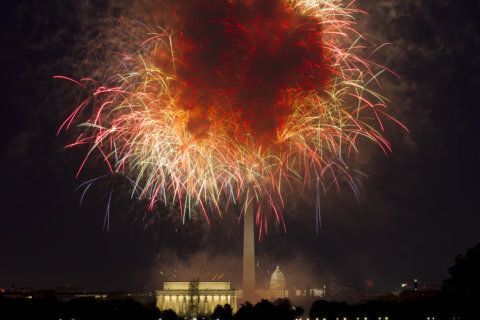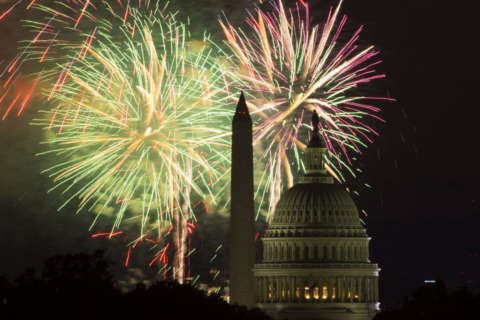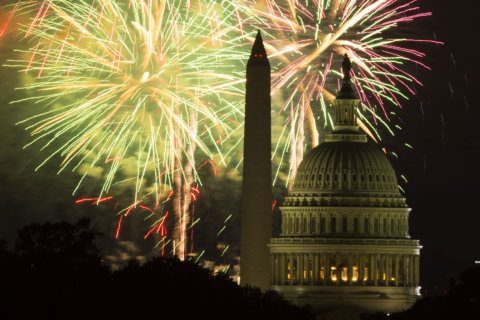The CEO of America’s largest consumer fireworks retailer spoke with President Donald Trump on Chinese tariffs in a private meeting just weeks before donating $750,000 worth of fireworks for the “Salute to America” July 4 show on the National Mall.
Phantom Fireworks boss Bruce Zoldan made his case to Trump in a private May 22 meeting with other business executives in Washington.
In a statement to WTOP, Zoldan confirmed the meeting and said he “did not specifically discuss fireworks or address the topic of fireworks and tariffs.”
He added, “I met the president with a group of businessmen who lead a variety of industries, and while tariffs were discussed in general, we did not equate the conversation to a specific industry. Discussions about Phantom and Grucci’s donation to this year’s Fourth of July performance commenced two months in advance of anything relating to tariffs.”
Zoldan noted that discussions for the July 4 donation had been going on for months.
Fireworks companies say tariffs in the escalating trade war with China will make fireworks more expensive for consumers, local and federal agencies. They say their products can’t be easily produced outside of China, mostly due to stricter U.S. regulations on the volatile chemicals that go into them.
The president “knows that fireworks are loved by his supporters and most Americans on the Fourth of July,” Zoldan told Bloomberg, which first reported the story.
He also told Bloomberg that the industry would lose several smaller companies and that larger businesses would be forced to fire employees as profits decline.
Zoldan told WTOP this week that there was nothing political behind the donation.
“The Phantom Fireworks family and the [Fireworks by] Grucci family are thrilled and honored to be a part of this. I know it’ll be somewhat controversial, I know that there will be some media that will play this out as political,” he said.
“When I said that people in my neighborhood came to watch the fireworks show at our house … We were watching fireworks, and everybody was not talking politics. They were talking America’s birthday, the Fourth of July, and that’s why we’re doing this.”
In years past, July 4 celebrations in Washington were handled by Garden State Fireworks, who are still contributing to the 2019 show alongside Phantom and Grucci.
This year’s Fourth of July celebrations won’t be hit by Trump’s import taxes, but the pyrotechnics industry isn’t the only one that wants Trump to back off from Chinese tariffs, and economic experts have been sounding the alarm.
Tariffs on Chinese and Mexican imports amount to potentially $190 billion a year in new taxes — paid by U.S. importers and typically passed on to consumers.
For American households, this means higher prices on fruits and vegetables, autos, electronic components and other necessities. What’s more, exporters, especially farmers, can expect to suffer retaliation when China and Mexico hit back with tariffs or other sanctions on exports from the United States.
The tariffs inflict other damage that is harder to measure. They generate uncertainty for American businesses over where to buy supplies, sell goods or situate factories and offices. And they rattle investors and undercut consumer and business confidence.
Researchers at investment bank UBS calculate that a 25% tariff on all Chinese imports would shave a full percentage point from U.S. growth over the next year. The economy grew 2.9% in 2018 and will likely be weaker for 2019. Add a 25% tax on Mexican goods, they say, and the United States could tumble into recession for the first time since 2009.
The Federal Reserve has taken notice. Chairman Jerome Powell made clear this week that the Fed is prepared intervene, likely by lowering interest rates, if the trade wars were deemed to threaten the expansion.
Still, it’s far from sure that Trump’s trade conflicts, even if they escalate, will imperil the economy. Pinelopi Goldberg chief economist of the World Bank, and economists Pablo Fajgelbaum of UCLA, Patrick Kennedy of the University of California, Berkeley, and Amit Khandelwal of Columbia University, calculated that the economic loss from the trade wars last year amounted a minuscule 0.04% of gross domestic product — the broadest gauge of economic output. (Their figure doesn’t include the latest tariff threats.)
One reason is that trade accounts for a surprisingly small portion of the economy. Exports and imports combined equal just 27% of U.S. gross domestic products, the World Bank calculates. The share is lower in only seven other countries, none of them an industrial power like the U.S.
Yet despite its modest economic role, trade punches above its weight in American political discourse. Consider the revamped version of the politically contentious North American Free Trade Agreement that the U.S. negotiated last year with Canada and Mexico, one of Trump’s policy achievements. Trump said the new pact — the U.S.-Mexico-Canada Agreement — would create jobs and restore America’s status as “a manufacturing powerhouse” by drawing factories back to the U.S. from low-wage Mexico.
But the independent U.S. International Trade Commission analyzed the new agreement and concluded that it would boost the economy by just $68 billion and add 176,000 jobs over six years — negligible gains in a $21 trillion economy and a job market exceeding 150 million people.
The Associated Press contributed to this report.









